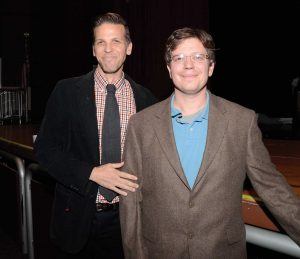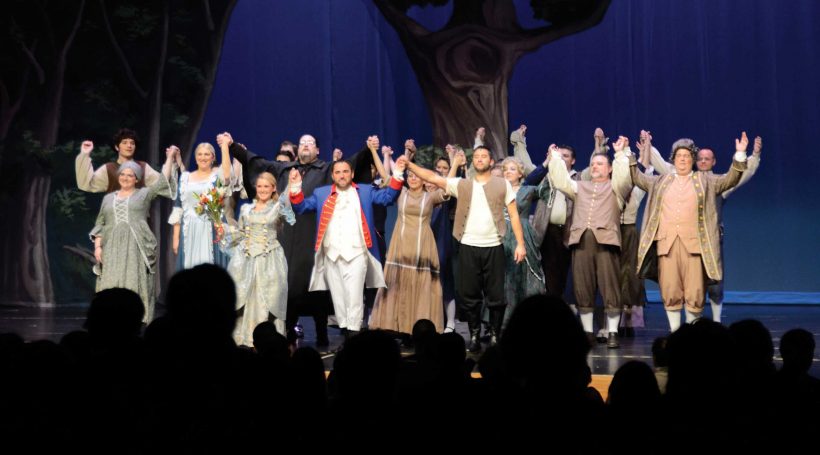Fittingly, Matthew Norcross’ “The Real Legend of Sleepy Hollow,” his reimagined version of the Washington Irving classic, came alive on Halloween weekend. Writing the music, lyrics and story, obtaining financing and convincing actors to accept roles was a two-year labor of love. All the while, he worked his day job teaching music in the Vineland public school system. More than 750 fans enjoyed the Clarksboro resident’s inaugural work. It was the first step for Norcross, 40, to realize his dream of composing musical theater.
How did your production of “The Real Legend of Sleepy Hollow” come about?
In college, my friend and I wrote a short musical, 20 minutes long, about a car accident we had gotten into. It was called “September 25, 1995,” because that’s when it happened. We were on a lunch break at school on the way to a local restaurant. We got into the car and a guy pulled out in front of us, and we crashed. We ended up going to the hospital but nobody was seriously injured. We decided to make a little opera about it so we locked ourselves into a room for five days and performed it at the school. It was mostly a joke, but everybody really liked it. It was an incredible experience, and I always wanted to do it again. During the course of us performing that show at Rowan, I met some of the people that are in my show currently. I was blown away by some of their voices.
What made you want to retell “The Legend of Sleepy Hollow”?
The idea popped into my head. It was a random thought. From when I had been in college until now, I worked on it in dribs and drabs. Then, two Julys ago I started working on it full-time. My formal university training was in music theory and composition, so it was a way to combine all my interests into one big project. I didn’t think I was capable of doing it until fairly recently.
The show is based on the book, but the word “real” in the title suggests a twist. The original book is a very sparse, very short story. It was published with 20 other short stories by Washington Irving, among them “Rumpelstiltskin.” It’s only about 60 pages long, big type in a small book.
It was easy to flesh it out because there were interesting, iconic characters. I had my own twist on it and changed some things around with poetic license. It’s implied that Brom Bones and the Headless Horseman are the same person in the book, but in my version the Headless Horseman is a different character. The ending has a big twist.
What first inspired your musical bug?
I took piano lessons starting when I was 10, and I always wanted to write my own music. I was in a few rock bands including playing keyboard in the group “Eleven Eleven” for a little while. They are a fairly well-known group in South Jersey. I didn’t start writing seriously until college.
You were Rowan University’s first master’s graduate in music theory and composition. What impact did Rowan have on developing your career?
I was getting a masters of education and also taking coursework in music theory and composition. They had just started the program and were in the process of getting the program solidified. By the time they were certified, I was done with my degree so I became the first graduate of that program. I was very lucky to have several professors help me out and take a personal interest in my development. They were absolutely respon- sible for my ability to do something like this.


Show director David Leidholdt and composer Matthew Norcross
What’s next for “The Real Legend of Sleepy Hollow” and for you?
I am looking to get the show into other theaters, as many as I possibly can. I’ve had three shows so far, so there was no way I was going to break even yet. But my goal is to do way more than break even. I think that’s attainable. I’m going to try to create a niche market for the Halloween season. It could be playing in who knows how many community theaters across the country. My ultimate goal is to compose shows for a living.
What’s the most important lesson you want to share with the students you teach?
The main lesson I’d like to impart on them – and it’s such a cliché – is that anything creative is 1 percent inspiration and 99 percent perspiration! It’s so much more work than people realize. Even more than I realized, and I knew what I was getting into. Perseverance and a staunch dedication are the hallmarks of any progress in music. Lots of kids want to take instrument lessons and it’s fun in the beginning, but then they quickly realize it’s just a lot of hard work. This show was more work than all of my college coursework combined. It became an all-consuming process. Personally, my social life definitely took a back seat and relationships with friends were postponed for a while.
You used kickstarter.com to raise funds. How does that work, and was it successful?
You go on the website and present your case of why people would want to fund your projects. You offer rewards, mementos from the show, based on what people pledge. If you hit your goal you receive the money, but if you’re short you don’t get anything. That makes it a gamble and hard to calculate. We set a $20,000 goal and reached it.
A portion of the ticket sales will benefit The Arc of Monmouth. Why is that organization important to you?
The Arc of Monmouth helps people with disabilities, most often with Down’s syndrome and autism. Brett Colby, our lead who played Ichabod, works for the organization. We had some cast members who are also dealing with these issues with their children, so it’s a good fit. Any time the show runs, it will benefit The Arc in some way. We are very proud to be affiliated with them.
You had a lot of community support. What did that mean to you?
It meant everything. John Burzichelli owns Hill Studio, which he donated to us for all of our rehearsals. That was an incredibly generous thing to do. Within the cast we had so many people go above and beyond their roles to help out and make sure the show happened. Several people who hadn’t done shows in over 10 years, really as a favor to me, came out of retirement. They gave everything they possibly had on stage and were incredible in so many ways. I’m going to spend the rest of my life trying to thank them adequately.










